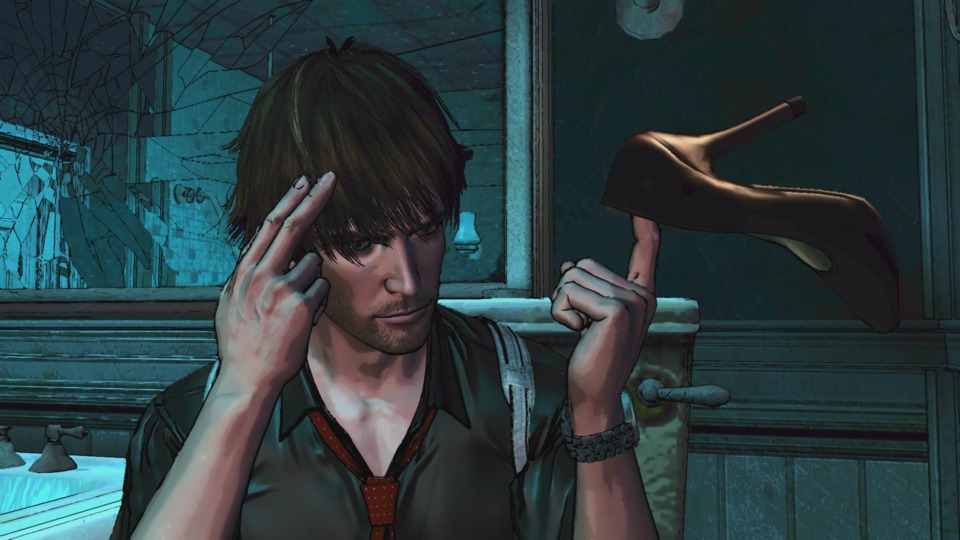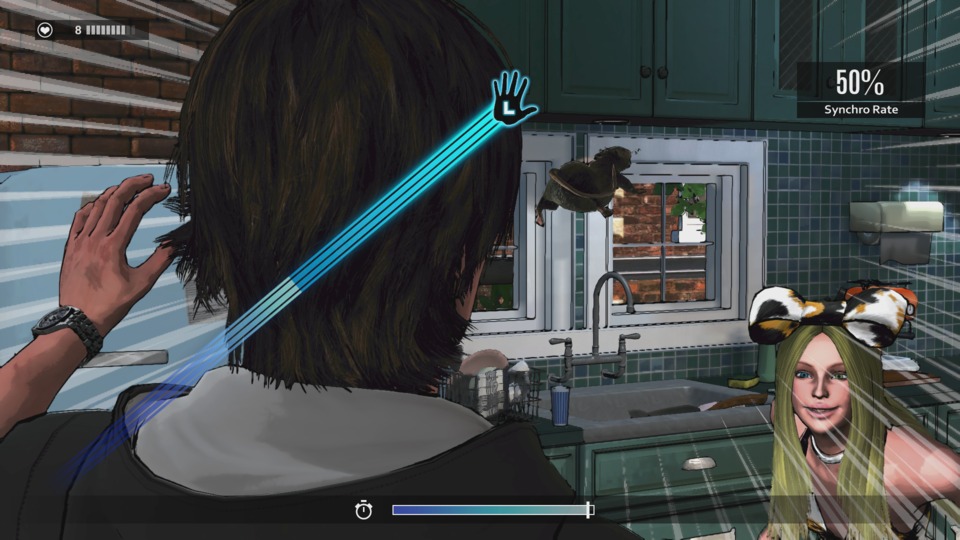Hidetaka "Swery65" Suehiro makes strange games. You need look no further back than 2010's Deadly Premonition for the definitive example of this fact. Essentially a half-busted third-person action game slathered in David Lynch-ian oddness, Deadly Premonition slowly but surely developed a rabid fanbase due largely to its bizarre aesthetics and comically ludicrous storyline. It wasn't exactly a very good game, but that didn't matter, because despite couching itself in familiar design elements, it still felt like something excitingly unfamiliar; otherworldly, even. Certainly it's not as if video games don't deal in weird on a regular basis, but Swery and his team at Access Games' brand of weird, as seen in Deadly Premonition, served as a signal that this was a creative voice--albeit a potentially insane one--worth paying attention to.

D4: Dark Dreams Don't Die reassures us of this notion. In following up Deadly Premonition, Swery has evidently taken note of what people found so intriguing about his last game, while still managing to deliver something fairly different in overall design. Instead of a third-person shooter, D4 wraps itself in the design tropes of point-and-click adventure games, tasking you with solving crimes by exploring environments, exchanging long strings of dialogue with oddball characters, and uncovering evidence. You'll be forgiven if you feel a twinge of exasperation as I tell you that this is also a Kinect game, though use of Microsoft's previously packed-in camera controller is optional. I played a decent amount of D4 with a controller, and the game works just fine that way. But if you really want to dive into the madness of D4, using the Kinect camera is absolutely recommended. I don't think I've ever recommended a Kinect-based control scheme when it wasn't 100% required, but given that this is a Swery game, perhaps it's no surprise that the unconventional way of playing D4 turns out to be its ideal.
In D4, you play as David Young, a haggardly depressed ex-cop so haggardly depressed that you just know he's got a murdered wife somewhere in his past. Formerly of the Boston P.D.'s narcotics unit, David quit the force after his wife--the uniquely named Little Peggy--is killed in a shooting that may or may not have something to do with a new and incredibly popular street drug called "real blood." During the crime, David also took a bullet to the head, yet somehow survived. As is custom in head-shootings, the lead in his brain has given him the unique ability to travel back in time using "mementos," objects that are associated with key moments in history. He uses these objects to solve crimes by inserting himself into the past. He is not merely an observer when he travels, but an active participant, able to physically engage and converse with the world around him.
That D4 stars a partial amnesiac former cop who uses a magic bullet lodged in his brain to travel through time solving mysteries is arguably the least weird thing about it. David is certainly an odd character--the fact that the actor who portrays him slides in and out of his hilariously terrible Boston accent at seemingly random intervals certainly helps--but the people he meets over the course of D4's first episodes are several orders of magnitude crazier than anything he's able to muster. Without spoiling their context, some of those characters include his gluttonous former partner Forrest Kaysen, who inhales pizza and hot dogs like a sentient black hole; a literally feral woman named Amanda who behaves like a cat and somehow has been allowed to take up residence in David's apartment; a snippy flight attendant who uses an inhaler to get high, often in the middle of conversations; a peril-obsessed OCD sufferer who counts the number of times windows on an airplane squeak; a slow-talking giant who laboriously spouts crypticisms while menacingly playing with a knife and fork; a flamboyant drug courier who refuses to stop talking about his glass eye; and an even more flamboyant, mannequin-toting fashion designer who exists as a sort of cross between Pygmalion and Meshach Taylor.

Every single one of these characters is amazing, so much so that it's absolutely worth digging through every possible conversational nugget the game offers just to see what bonkers thing will come out of their mouths next. Though a fair amount of that conversation is baked into the story progression, many of the best bits require exploring beyond the main path. At times, as with the aforementioned slow-talking giant, that conversation can begin to drag. You can skip any dialogue bit, but there's often quite a lot of it, and in cases where you are, say, speaking to a man who sounds like a record slowed down to 1/4 speed, it can straight up kill the game's pacing. Still, those problematic parts are worth the risk compared to how many genuinely, insanely funny parts you'll experience otherwise. Once you get to David's apartment, definitely seek out every extra bit you can with Forrest, so that you can witness some of the grossest acts of pure gluttony ever portrayed in a game, while also listening to one of the looniest conversations anyone's ever had about the differences between Boston and New York clam chowder recipes.
This is what struck me most about D4. It's something apparent in Deadly Premonition, too, but D4 hammers home just how wonderfully skewed the developers' perception of American culture really is. Imagine telling someone from another culture the five or six things you can immediately remember about the city of Boston, then ask them to write a story set in the region using only that information. That's how D4 comes across; just informed enough to seem correct on the surface, while flailing wildly and unpredictably once you get past that thin veneer. Between the clam chowder debates, the experimental-sounding accents, and the fake Dropkick Murphys song that pops up during a few action sequences, D4 creates a version of Boston that feels born out of an alien simulation, and the game is so much better for it.
Strange, then, that D4 is designed in such a way as to make exploration of that world a chore. Because this is a game designed with Kinect in mind, every action comes with a specific gesture (or gesture icon you can highlight using the controller) attached to it. You can't just walk around an environment, so much as you can select a traversal icon, which will then take you to the next available spot. You can move the camera around and spin David around 360 degrees in most situations, so it's not exactly difficult to get to the stuff you want to examine, but it still takes a bit longer to get around than is comfortable. More irritating is the game's stamina system, which drains any time David moves anywhere or does anything. It doesn't drain in huge chunks, and the game is decent about meting out power-ups you can use to regain stamina, but it's not enough to prevent the system from getting in the way. Instead of being able to freely poke and prod at every bizarre thing you see, you have to keep eyeing a meter to ensure that going and having a conversation with someone won't cause you to drop dead and the mission to restart.
Fortunately, this is about as clunky as D4's gameplay gets. Investigation is a relatively simple process, streamlined by your ability to highlight objects of note in the environment using your psychic powers (powers you replenish by drinking booze, of course). By and large, the Kinect controls work as you would want them to, and the game is good about throwing a variety of gestures at you. You'll do plenty of holding up hands to select icons and random swipes to mimic on-screen actions, but you'll also find yourself swinging your arms as though you were holding a baseball bat, pantomiming the action of drinking tequila and pounding the shot glass, and even activating your magical detective powers by putting your fingers up to your temples like you're some hack psychic from the '50s. The relative ease of Kinect motion isn't altogether lost when switching to a controller. Most hand motions are replaced by control stick movements, which works well enough, but sometimes distracts from the chaos going on on-screen, which you most certainly do not want to miss.

The very fact that D4 is a Kinect-focused game makes it something of a difficult sell, nowadays. That it is also an episodic game, and one from a developer best-known for a cult oddity that even its most ardent fans have a difficult time explaining succinctly, perhaps spells doom for D4. I only mention this because of D4's episodic structure, which might prove a problem if the game doesn't find an audience. The $15 download currently available nets you a prologue episode and two full episodes, which span a single case. That second episode ends on a particularly stiff cliffhanger, and it doesn't even begin to wrap up the larger mystery surrounding who killed Little Peggy and why. And even if this season's additional episodes are in the can (I'm assuming there are more episodes to this season than just the two provided here), there's no guarantee of a season two that I'm aware of.
That said, I'd have no problem dropping that price for what pieces of D4 are there, even without an eventual resolution. D4 isn't what I'd easily call a good game, but it's a good enough one built around such magnificently strange material that I have zero qualms about recommending it to just about anyone. I guarantee half the people I'd recommend it to will find it impenetrably weird, but that other half will adore what Swery and his team have constructed, and hopefully will continue constructing, in D4.